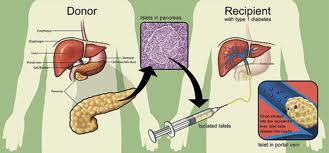This is a novel step in the management of diabetes. Many people, even today, fail to understand the indications for transplantation. Many assume this can be done for almost anybody with diabetes. Incidentally, as early as 1890 in England, the first transplant involving fragments of sheep pancreas was first tried on a young boy with uncontrolled diabetes. Improved surgical techniques, better immunosuppressive medicines and healthier recipients have helped improve the outcomes.
What is pancreas transplantation?
This is a surgical procedure involving transfer of a healthy pancreas from a deceased donor to a person whose pancreas no longer functions at all.
Indications:
This is reserved only for those with type 1 diabetes , but does not form part of standard treatment.
- When standard insulin treatment cannot control diabetes type 1
- Poor sugar levels
- Kidney damage in those with diabetes type 1
- Frequent insulin reactions
Types:
- Pancreas only transplant
- Simultaneous pancreas- kidney transplant
- Pancreas transplant after kidney transplant
Normally the endocrinologist or the diabetologist refers the patient to the nephrologist, the specialist in kidney diseases, who will run some tests to assess extent of kidney function. Once the possibility of transplant is considered, the transplant team is consulted. The team comprises a medical transplant doctor, a transplant surgeon, diabetes educator, a social worker, a psychologist and a financial advisor.
Pre requisites:
It will be assessed if you are a healthy candidate to tolerate the procedure, if there is anything in your records to hinder the success of the procedure or if you are compliant with the advice given by the team. It is an emotional, mental, physical and financial burden on the family and the patient.
Not to be forgotten are the legal issues associated with the transplantation ( still considered a taboo in many parts of the world), availability of donor, blood group and the severity of the kidney damage. Most of the centers have a waiting period which varies. The donor must be aged between 4 and 55 years and free from diabetes and must not be obese. There are areas in the world where organ donation is a business and various trade rackets have been busted.
Do your homework well….
Find out about the transplant center- the number and type of transplants done there, survival rates, the support given, the recovery phase stay and travel arrangements. The cost of the procedure is also of importance and how much the insurance will cover.
After the transplant you can expect the following:
The surgery can last for 4 to 6hours generally.
Stay in the intensive unit for the first few days- this is for frequent monitoring and to cut back on visitors during the crucial first few days. There will be frequent blood checks. The attendants will be asked to wear a face mask and those with common cold, fever or cough should be refrained from attending on the patient. Frequent hand washing with a hand sanitizer is needed.
Insulin is no longer needed as the new pancreas starts functioning. That will be the striking change the patient notices. However, one should also bear in mind the possibility of a rejection, possibility of a bacterial, viral or fungal infection as immunity is compromised by the medicines taken to prevent the rejection.
Failure of the pancreas to function can also occur for some unfortunate people.
The side effects of the medicines to prevent rejection include:
- Weak and thin bones
- High blood pressure
- High cholesterol levels
- Puffiness of the face
- Diarrhea or constipation
- Gums can be swollen, mouth ulcers can occur
- Acne on the face
Survival rates:
These depend on a lot of factors. Based on data from around the world, 72% of the simultaneous pancreas- kidney transplant survive after 5 years, 59% of the pancreas after kidney transplant survive after 5 years and 52% of pancreas only transplants survive after 5 years.















